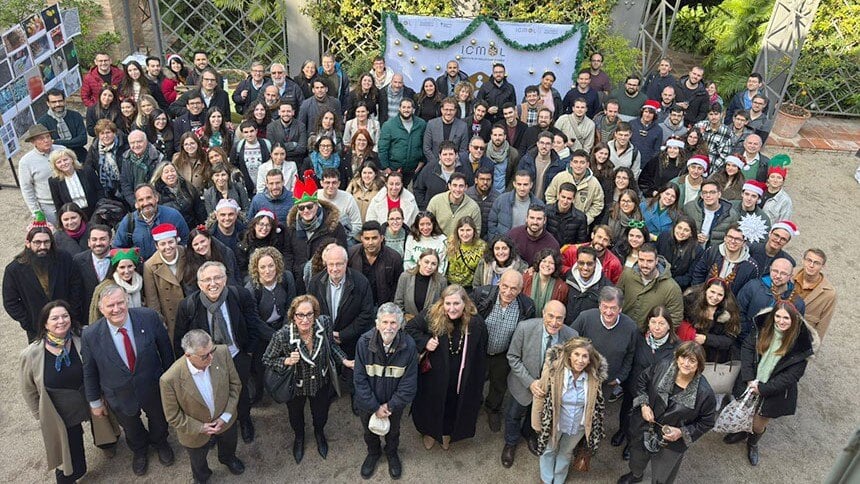The Institute of Molecular Science of the University of Valencia (ICMol) opened the 23rd edition of its Scientific Conference this Friday with the usual review of the state of this research centre, recognised as a María de Maeztu Unit of Excellence. The programme, which includes three lectures and will conclude this afternoon with a roundtable discussion on disruptive innovation and technological planning, has showcased the latest advances in various fields of nanoscience and paid tribute to the late chemist Miguel Ángel Alario, who recently passed away
The Vice-Rector for Research at the University of Valencia, Carlos Hermegildo, the Director General of Science and Research, Rafael Sebastián, the Executive President of the Rey Jaime I Awards Foundation, Javier Quesada, the Dean of the Faculty of Chemistry at the UV, Rafael Ibáñez, and the Director of the Institute of Molecular Science (ICMol), Eugenio Coronado, inaugurated this morning the 23rd edition of the scientific conference that the centre has held annually since its creation in 2000. The event took place at the Botanical Garden of the University of Valencia.
As in every edition, the conference reviewed the status of this research institute, recognised as a María de Maeztu Unit of Excellence, and highlighted, in an accessible manner, the latest advances in various fields of nanoscience. To this end, it featured lectures by Wolfgang Parak (Universität Hamburg), Ramón Martínez Máñez (Universitat Politècnica de València), and Marisol Martín-González (CSIC), as well as the roundtable discussion ‘Disruptive Innovation or Technological Planning? Integrating Science, Economics, and Politics’, which will conclude the conference this evening in the Cavanilles Auditorium of the Botanical Garden.
“At the ICMol, scientific excellence converges with a strong commitment to innovation and creativity,” said the centre’s director, Eugenio Coronado, as he introduced the annual report of the institute, presented in its three main dimensions: as a centre of excellence in molecular nanoscience, as a centre of excellence in chemistry, physics, and materials science, and as a European hub for higher education.
With 18 research groups, 81 doctoral theses in progress, 145 publications per year, 7 active ERC grants, and a staff of 316 people from 35 countries – 145 women and 171 men – the ICMol stands out as the leading institute in Physics and the second in Chemistry according to the Nature Index, reinforcing the University of Valencia’s position as the second-ranked Spanish university in Chemistry. In 2024, the institute secured funding amounting to over €14 million – €3.1M for European projects, €6.2M for national projects, and €3.6M for local projects – across its various research lines, which include advanced functional materials, molecular spintronics, molecular electronics, and molecular design of biomaterials. Additionally, over €500,000 was allocated for transfer funding, as explained by Eugenio Coronado during his presentation. The director also emphasised the ability of research institutes to drive innovation, “something that can also be achieved through basic science, as demonstrated by this centre, whose research has already generated two spin-offs.”
“Science is fundamental for decision-making in all aspects, both for administrations and companies, and the Valencian government clearly understands the emphasis that must be placed on the transfer of knowledge to society and industry,” said Rafael Sebastián, the Director General of Science and Research. Rafael Ibáñez, Dean of the Faculty of Chemistry at the University of Valencia, advocated for cooperation with the university’s research institutes and unique centres, “as a way to ensure opportunities for the scientific and professional development of its graduates.” Meanwhile, the President of the Rey Jaime I Awards Foundation, Javier Quesada, highlighted the scientific excellence of the ICMol and encouraged its researchers to aspire to the Rey Jaime I Awards, which, with a jury composed of established scientific figures, mostly Nobel laureates, are likely the most prestigious scientific awards in Spain.
The event commemorated the figures of the UV Professor Miguel Julve and the chemist and entrepreneur Miguel Burdeos, who both passed away in 2024, and paid tribute to the scientist Miguel Ángel Alario, who was a Professor of Inorganic Chemistry at the Complutense University of Madrid and recipient of the Rey Jaime I Award in 1991. Miguel Ángel Alario passed away last August.


